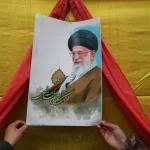

Russian President Vladimir Putin’s invasion of Ukraine presents an “existential” threat to Ukraine’s neighbors in NATO, according to a senior European envoy.
“It is about supporting Ukrainians in the fight that carry existential risks, also for Estonia, and for the foundational rules of our common world order,” Estonian Ambassador Kristjann Prikk said Tuesday. “For the West, I would argue, this is a 1939 moment again: if Putin emerges from this war with something that he didn’t have before, then the consequences for the entire West will be catastrophic.”
Prikk offered that warning while marking the 105th anniversary of Estonia’s independence from the Russian Empire. Their declaration of independence is commemorated every year on Feb. 24, a date now associated with Putin’s launch of the invasion to overthrow the Ukrainian government. The Russian offensive prompted Estonia to provide almost $400 million of military aid to Ukraine over the last year, which amounts to more than 1% of the Baltic State’s gross domestic product.
“Estonia firmly believes that the world has to do whatever it takes to deal Russia a clear, decisive defeat in Ukraine,” Prikk said. “And Ukraine has to win this fight. The aggressor has to fail.”
‘KYIV STANDS TALL’: BIDEN VOWS TO REMAIN STEADFAST AGAINST PUTIN IN UKRAINE
The misgiving isn’t unique to Estonia. Polish officials likewise argue that a Kremlin success in Ukraine could lead to conflict on NATO’s eastern front.
“I would not wish that Russia is half-winning this war because they are preparing the next round,” Polish Prime Minister Mateusz Morawiecki told Newsweek this week. “They are preparing for the next attack, the next offensive, potentially on the Baltic States or Finland or Poland or Romania or Moldova — any other country bordering [Russia].”
The drive to deny Russia any kind of battlefield success is a hallmark of most NATO members who gained independence following the collapse of the Soviet Union. Officials in those capitals often have been frustrated by a perceived hesitation on the part of the United States and western European powers to express with such frankness the ambition to secure a Ukrainian victory. Yet Secretary of State Antony Blinken’s team struck a note of emphatic agreement on Tuesday.
“Estonia’s history has demonstrated that democracy and independence are not free and must be defended,” deputy assistant secretary Doug Jones, the lead State Department official for northern Europe and the Baltic countries, said at the event. “We are committed to ensure that Russia’s aggression ends in complete defeat.”
Putin has stoked the kinds of anxieties voiced by Prikk by justifying his ambitions in Ukraine on the grounds that the “historical territories that are now called Ukraine,” as he put it Tuesday, were part of the historic Russian Empire. Yet that also could be said of Estonia, as Putin noted earlier this summer when he compared his invasion of Ukraine to Peter the Great’s victory in the Great Northern War, which wrested much of modern Ukraine from Swedish control.
“The same is true of the western direction, Narva and his first campaigns. Why would he go there? He was returning and reinforcing; that is what he was doing,” Putin said. “Clearly, it fell to our lot to return and reinforce as well. And if we operate on the premise that these basic values constitute the basis of our existence, we will certainly succeed in achieving our goals.”
Czar Peter took Narva in 1704, but the Kremlin recognized the city as part of Estonia in the treaty that ended the Estonian War of Independence in 1920, two decades before the Soviet Union annexed Estonia once again.
CLICK HERE TO READ MORE FROM THE WASHINGTON EXAMINER
“Russia started this war in order to dismantle the trans-Atlantic security architecture that has kept Europe at peace and maintained American-European moral leadership in global affairs for decades,” Prikk said. “So, we have to get this thing right.”







